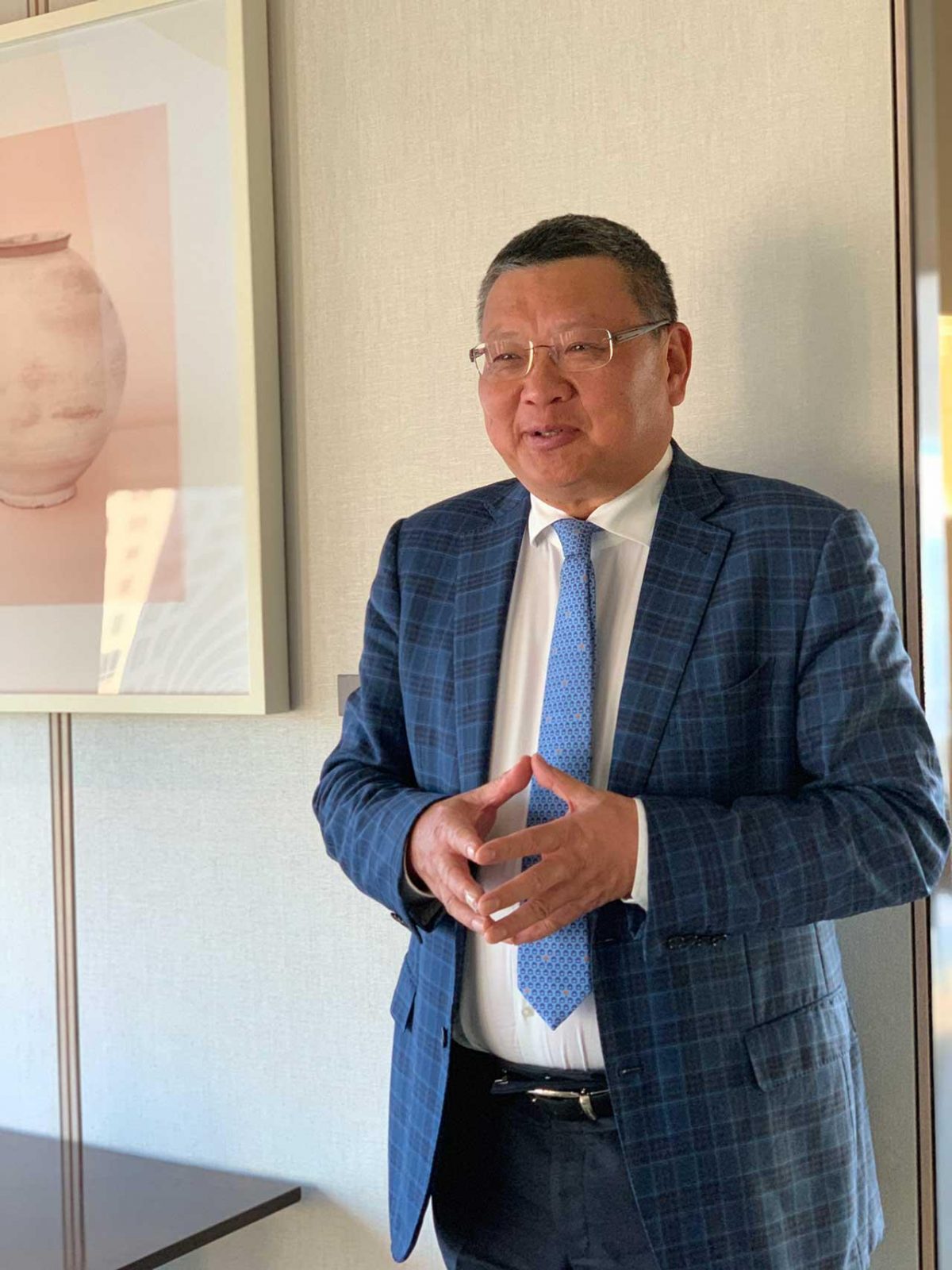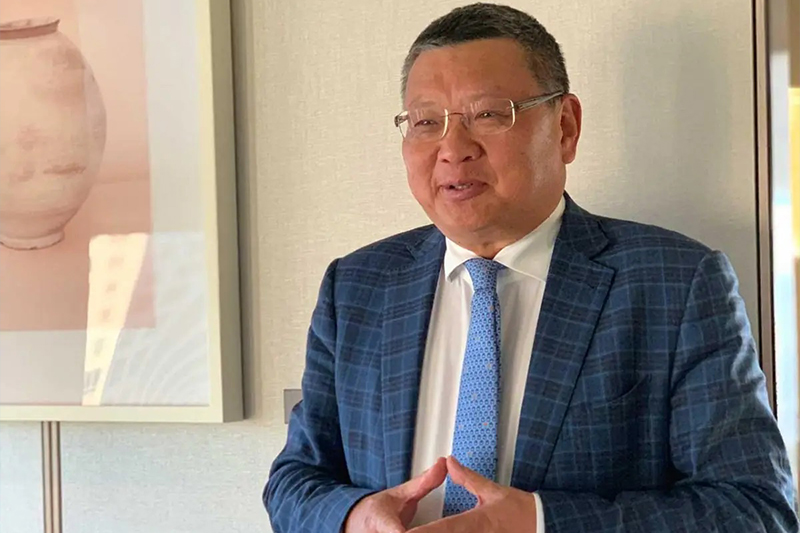On October 29, 2019, Founding Dean of Cheung Kong Graduate School of Business (CKGSB), Xiang Bing met with ChosunBiz to discuss the value of business schools and the future of the Chinese economy. Underscoring how China has managed to maintain and strengthen its position as the world’s third largest economy since 2008, Dean Xiang said, “If companies fail to understand the East Asian markets, including China, there is a greater risk of management making wrong decisions.”

Dean Xiang Bing meeting with ChosunBiz
The emergence of global technology behemoths such as Alibaba, Tencent, and Huawei has prompted a growing interest in how to conduct business in China. As a result, a premium is now placed on a Chinese MBA which integrates topics related to China with case study analyses and discussion-based courses that are common in US MBA programs. China’s China European International Business School (CEIBS), CKGSB and BiMBA Business School of the National School of Development at Peking University are among the beneficiaries of such shift in focus.
CKGSB is a leading business school in China founded in 2002. The school has campuses in Beijing, Shanghai and Shenzhen and offices in Hong Kong, London and New York. CKGSB boasts a roster of distinguished alumni including Jack Ma, founder of Alibaba; Shi Yuzhu, Chairman of Giant Interactive; Li Dongsheng, Chairman of electronics company TCL Corp.; and Fu Chengyu, Chairman of China’s national oil and gas enterprise Sinopec.
Dean Xiang is an expert in China’s business management, education development and innovation. He earned a Ph.D. in Business Administration from the University of Alberta in Canada and a M.S. in Engineering from Xian Jiaotong University. Prior to joining CKGSB, Dr. Xiang was a professor at Beijing University’s Guanghua School of Management, where he pioneered the school’s Executive MBA program. He is also one of the founding members of China Europe International Business School (CEIBS) in Shanghai. He also served on the faculty of the Hong Kong University of Science and Technology (HKUST) and University of Calgary in Canada. Dr. Xiang’s research areas include state and business relations, reform of state-owned enterprises in China and innovation.
Dressed in a blue check suit and tie, Dean Xiang spoke with an unabashed authority on a range of topics including education on Chinese business practices, the global economic outlook, and strategies that Korean companies should consider when entering the Chinese market.
Q. Since the global financial crisis, there is a growing concern that MBA programs have turned into ‘high cost, low return’ degrees. What do you think of this?
“Upon earning an MBA degree, there is still a high percentage of individuals seeking employment at large investment banks such as Goldman Sachs and global consulting firms such as Mckinsey. China is no exception. Those industries, however, are not growing fast enough. This should not be a cause for frustration because new opportunities are being created as corporate social activities expand into an array of diverse fields. Case in point: Interest in corporate social responsibility (CSR) and activities to support social organizations are on the rise.”
Q. What makes the CKGSB MBA unique?
“Our goal is to be the Googles and Facebooks in global business education. Over a short history of 17 years, we have positioned ourselves as a leading business school in China. We did not, however, rest on our laurels and we have continued to innovate. For example, from the inception of CKGSB, we incorporated humanities, history, religion and philosophy into our curriculum. We are the first business school to do so. Our hope is to help graduates enjoy an enriching life, not just a rich life.”
Q. Wouldn’t spending time on humanities strip away time to study subjects that are more practical?
“In order for future business leaders to be competitive, they must have passion and empathy. There are clear limitations in the winner-takes-all mindset. Humanities is the foundation of passion and empathy. It also helps when managing talents of diverse nationalities. Isn’t this sufficiently practical?”
Q. We cannot discuss innovation without cutting-edge technology, can you discuss how CKGSB leads in this?
“We are helping our students keep up with the changing trends in high tech in a variety of ways. As part of our efforts, we established partnerships with the engineering department at Columbia University in 2016 and UC Berkeley in 2017. Furthermore, we are collaborating with leading technology companies such as Tencent, Baidu, and DJI to provide insight into China’s innovation ecosystem to our international students.”
Q. China’s economic growth rate fell to 6% in the third quarter of 2018 from 6.8% in the first quarter. On a quarterly basis, it is the lowest level in 30 years. Do you see this as a concern or not?
“China’s market is much larger than the US, Germany and Japan combined. Even with a growth rate of 6%, there is no doubt that, in terms of size, the Chinese economy will serve as a leading growth engine in the world economy for the foreseeable future. Since 2008, the Chinese economy has been responsible for about one third of global economic growth. If any country misses the opportunity in China, it will face difficulties in competing in the global market. Another attraction point of the Chinese economy is that there is still room for deregulation. There are quite a few areas that are monopolies or oligopolies. Removing barriers to market entry will accelerate growth.”
Q. Previously, Samsung Electronics commanded the leading position in the Chinese smartphone market. Today, Samsung’s market share is at around 1%. Is it possible for Korean companies to create new opportunities in the Chinese market?
“Absolutely yes. It takes a forward-looking approach. For Korean companies, the Korean market alone is too small. There is a need to strengthen cooperation not only with China but also with Japan. It would be great if a Korean entrepreneur with a groundbreaking item or technology built an ecosystem that could be established simultaneously in Korea, China and Japan.”
Q. What are some of the promising sectors in China in the future?
“The pace of deregulation in the consumer goods sector will spur enormous opportunities. Healthcare, which is relatively stagnant, is also expected to grow. This is especially true as China has a rapidly aging demographic.”
According to a report by Zhongtai Securities, China is expected have an aging society by 2021, with the population aged 65 years and above reaching 14%. Clusters of population aging are already present in Shandong and Liaoning provinces with population aged 65 years and above surpassing 14%. Zhongtai Securities predicts China to become a super-aged society by 2031 with a total population aged 65 years and above reaching 20%.
Q. What are your thoughts on the decision by the Trump Administration to impose sanctions against Huawei due to security concerns?
“Security issues in communication equipment are a familiar topic to me as I majored in engineering. Yes, one may have security concerns over Huawei equipment. Conversely, however, China will have the same security concerns on ICT equipment made by Cisco, Microsoft and IBM. Security issues of telecommunication equipment need to be resolved by establishing standards through a committee comprised of multinational experts rather than through a single country, such as the US, leading the way.”
Q. How important is Hong Kong to the Chinese economy?
“Today’s Shenzhen would not exist without Hong Kong. Shenzhen was able to develop remarkably because it was able to attract talent, capital and information from Hong Kong. The Chinese government wants to build Shenzhen as the poster child of China’s innovation. It will be impossible for Shenzhen to grow to the next level without the support of Hong Kong. Separately, no other city in China can replace the role of Hong Kong, a global financial hub.”
To read the original article in Korean, please click here.




















